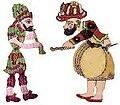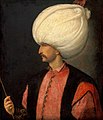Merhaba! Türkiye portalına hoş geldiniz. Hi! Welcome to the Turkey portal.
 | |
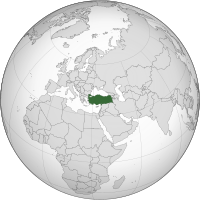
| |
Turkey, officially the Republic of Türkiye, is a country mainly in Anatolia in West Asia, with a smaller part called East Thrace in Southeast Europe. It borders the Black Sea to the north; Georgia, Armenia, Azerbaijan, and Iran to the east; Iraq, Syria, and the Mediterranean Sea (and Cyprus) to the south; and the Aegean Sea, Greece, and Bulgaria to the west. Turkey is home to over 85 million people; most are ethnic Turks, while ethnic Kurds are the largest ethnic minority. Officially a secular state, Turkey has a Muslim-majority population. Ankara is Turkey's capital and second-largest city. Istanbul is its largest city, and its economic and financial center, as well as the largest city in Europe. Other major cities include İzmir, Bursa and Antalya.
Human habitation began in the Late Paleolithic. Home to important Neolithic sites like Göbekli Tepe and some of the earliest farming areas, present-day Turkey was inhabited by various ancient peoples. Hattians were assimilated by the Anatolian peoples. Classical Anatolia transitioned into cultural Hellenization following the conquests of Alexander the Great; Hellenization continued during the Roman and Byzantine eras. The Seljuk Turks began migrating into Anatolia in the 11th century, starting the Turkification process. The Seljuk Sultanate of Rum ruled Anatolia until the Mongol invasion in 1243, when it disintegrated into Turkish principalities. Beginning in 1299, the Ottomans united the principalities and expanded; Mehmed II conquered Istanbul in 1453. During the reigns of Selim I and Suleiman the Magnificent, the Ottoman Empire became a global power. From 1789 onwards, the empire saw major transformation, reforms, and centralization while its territory declined.
In the 19th and early 20th centuries, persecution of Muslims during the Ottoman contraction and in the Russian Empire resulted in large-scale loss of life and mass migration into modern-day Turkey from the Balkans, Caucasus, and Crimea. Under the control of the Three Pashas, the Ottoman Empire entered World War I in 1914, during which the Ottoman government committed genocides against its Armenian, Greek and Assyrian subjects. Following Ottoman defeat, the Turkish War of Independence resulted in the abolition of the sultanate and the signing of the Treaty of Lausanne. The Republic was proclaimed on 29 October 1923, modelled on the reforms initiated by the country's first president, Mustafa Kemal Atatürk. Turkey remained neutral during most of World War II, but was involved in the Korean War. Coups in 1960 and 1980 interrupted the transition to a multi-party system.
Turkey is an upper-middle-income and emerging country; its economy is the world's 18th-largest by nominal and 11th-largest by PPP-adjusted GDP. It is a unitary presidential republic. Turkey is a founding member of the OECD, G20, and Organization of Turkic States. With a geopolitically significant location, Turkey is a regional power and an early member of NATO. An EU-candidate, Turkey is part of the EU Customs Union, CoE, OIC, and TURKSOY.
Turkey has coastal plains, a high central plateau, and various mountain ranges; its climate is temperate with harsher conditions in the interior. Home to three biodiversity hotspots, Turkey is prone to frequent earthquakes and is highly vulnerable to climate change. Turkey has universal healthcare, growing access to education, and increasing innovativeness. It is a leading TV content exporter. With 21 UNESCO World Heritage sites, 30 UNESCO intangible cultural heritage inscriptions, and a rich and diverse cuisine, Turkey is the fourth most visited country in the world. (Full article...)
Selected article -
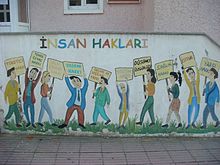
Human rights in Turkey are protected by a variety of international law treaties, which take precedence over domestic legislation, according to Article 90 of the 1982 Constitution. The International Covenant on Civil and Political Rights (ICCPR) was not signed by Turkey until 2000. As of today, however, Turkey is party to 16 out of 18 international human rights treaties of the United Nations. The issue of human rights is of high importance for the negotiations with the European Union (EU).
In 2022, Freedom House rated Turkey's human rights at 32 out of 100 (not free). (Full article...)General images
Did you know -
- ... that the land of Haydarpaşa Cemetery, a burial ground in Istanbul, Turkey for British Commonwealth soldiers from three wars, belonged to Suleiman the Magnificent? (May 16, 2007) Wikipedia:Recent additions 141
- ... that the British Levant Company avoided a fatal mistake of other chartered companies by paying their consuls and ambassadors a pension, so that they would not impose taxes on merchants for personal gain? (June 18, 2006) Wikipedia:Recent additions 72
- ... that Trdat the Architect reconstructed the dome of the Hagia Sophia in 989 and built the Cathedral of Ani? (January 6, 2007) Wikipedia:Recent additions 115
- ... that Mehmet Gürs, a Turkish chef of Scandinavian descent, called his Istanbul restaurant Mikla, which is derived from Miklagard, the Viking name of the city in the 10th century? (November 15, 2012)
- ... that footballer Hasan Ahmet Sari left Istanbul with his family after living through the 1999 İzmit earthquake? (August 18, 2011)
- ... that following the assassination of Diyarbakır police chief Gaffar Okkan in 2001, more than a hundred babies were named after him? (February 7, 2014)
- ... that the Xhosa Wars veteran Stephen Bartlett Lakeman
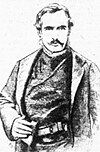
Selected picture
Selected biography -
Tuncay Volkan Şanlı (Turkish pronunciation: [tunˈdʒaj ˈʃanɫɯ]; born 16 January 1982), often known mononymously as Tuncay, is a Turkish former footballer and the current manager of Turkish club Sakaryaspor.
He naturally played as a striker, but was also positioned as an attacking midfielder and on either wing. He was in the Turkey team that finished in third place in both the 2003 Confederations Cup and the 2008 European Championships. With 22 international goals in 80 caps, he is Turkey's third-highest scorer of all time, and tenth-most capped player. (Full article...)Selected video -
Selected quote -
| “ | A satiated man doesn't know what's hunger, a healthy man doesn't know what's disease. | ” |
Recognized content
Provinces
Related portals
Religions in Turkey
Neighbouring countries
Countries with related heritage
WikiProjects
Turkish wikipedia
 |
There is a Turkish version of Wikipedia, the free encyclopedia. |
Wikimedia
The following Wikimedia Foundation sister projects provide more on this subject:
-
Commons
Free media repository -
Wikibooks
Free textbooks and manuals -
Wikidata
Free knowledge base -
Wikinews
Free-content news -
Wikiquote
Collection of quotations -
Wikisource
Free-content library -
Wikiversity
Free learning tools -
Wikivoyage
Free travel guide -
Wiktionary
Dictionary and thesaurus
















































